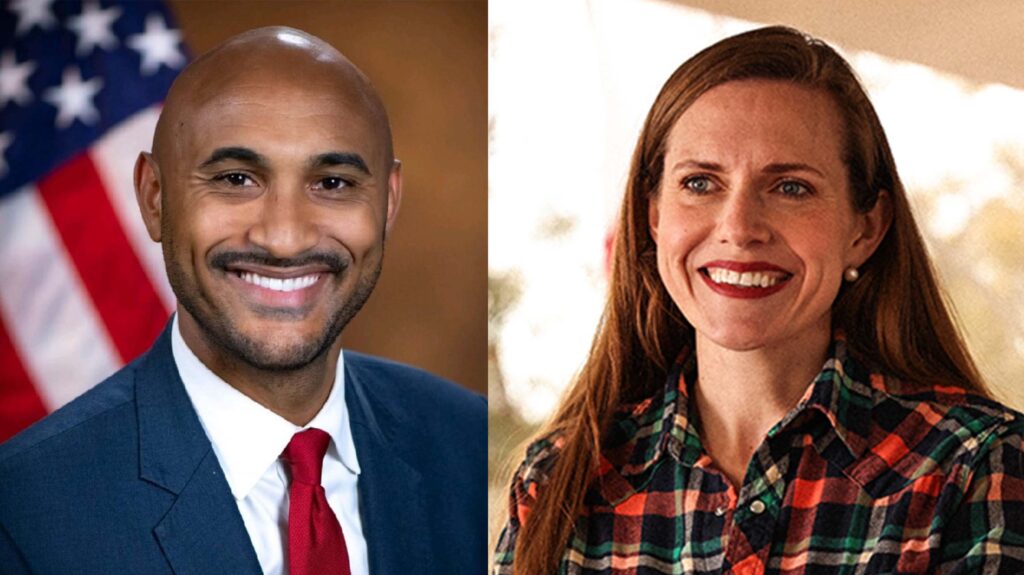|
Getting your Trinity Audio player ready...
|
In a year marked by significant political shifts and landmark decisions, Alabama saw several major stories that reshaped the state’s landscape. From controversial court rulings to historic electoral victories, these five stories stood out as particularly impactful in 2024.
Here’s a look at the developments that defined the year in Alabama politics and policy.

Commissioner Kent Davis
Former ADVA Commissioner Kent Davis spoke on his controversial firing
In late November, I had the chance to speak with Rear Admiral Kent Davis, the former commissioner of the Alabama Department of Veterans Affairs after his controversial firing by Gov. Kay Ivey.
The governor had publicly accused Davis of mishandling American Rescue Plan Act (ARPA) funds, but Davis described how the governor’s move was flawed and unsubstantiated. Davis also revealed that he intends to file “at least one lawsuit”, to challenge Ivey’s use of her “supreme executive power” to remove him from his position.
Davis’s firing was extremely unpopular among Alabama’s veteran community, and many – including Davis – suspect that the move was made in retaliation for an ethics complaint that he had filed against the Alabama Department of Mental Health.
Davis went on to describe flaws he sees in the entire mental health industry in Alabama, and bemoaned the fact that the industry’s monopolistic tendencies prevent Alabamians – including veterans – from getting adequate care.
Anonymous racist texts were reported at campuses across the country following Trump’s presidential victory
In the days following Donald Trump’s victory in the 2024 presidential election, individuals across the country – specifically Black students at college campuses – began reporting that they had received racist, threatening text messages.
Various individuals shared screenshots of the racist texts to social media. Each message followed a nearly identical format, referencing the recipients by name before telling them they have been “selected to pick cotton at the nearest plantation.”
Students at the University of Alabama, and other Alabama schools were among those who reported receiving the messages, as did students at Clemson University in South Carolina, Georgia residents, women in Detroit, and others.
Multiple civil rights groups denounced the incident, including the Southern Poverty Law Center, and the University of Alabama’s Chapter of the NAACP. Many students and their families attributed the incident to Trump’s victory, claiming that the president-elect emboldened his supporters to engage in open racism.

The Heflin-Torbert Judicial Building in Montgomery, which is home to the Alabama Supreme Court.
The state of IVF treatment following the Alabama Supreme Court’s controversial decision
IVF became a national issue this year after the Alabama Supreme Court’s February 2024 decision ruled that frozen embryos used in IVF treatment were to be considered human beings under the law.
As Democrats rallied around protecting IVF as a wedge issue to sway voters during the 2024 election cycle, many Republicans, including Donald Trump and Katie Britt, attempted to position themselves as supporters of IVF as well. The Alabama State Legislature and Gov. Kay Ivey also worked to roll back the court’s decision, passing legislation to protect IVF providers from legal consequences. However, GOP messaging around the issue remained shaky and failed to adequately address public fears that IVF access was, and is, in immediate danger. Despite their claims of supporting IVF accessibility, Republicans in the U.S. Senate blocked a bill in September that would have codified IVF protections into law and mandated insurance coverage of related procedures.
In October, the U.S. Supreme Court also blocked an IVF clinic’s appeal of the Alabama Supreme Court decision, again failing to alleviate anxiety among providers and the public.
I also had the opportunity to speak with Dr. Kaylen Silverberg, M.D., the Medical Director at Texas Fertility Center and the Advisory Board Chair for Americans for IVF, to discuss IVF and its newfound political relevance. In our conversation, Silverberg dispelled many of the misconceptions surrounding the procedure and advocated for the passage of the HOPE with Fertility Services Act, a congressional bill which would expand access to IVF treatment and mandate insurance coverage similar to the Right to IVF Act that Republicans blocked in September.
Communications Workers of America went on strike against AT&T, and won
In August, AT&T workers in Alabama joined fellow Communications Workers of America members in a strike across the Southeast that included around 17,000 employees.
Following the expiration of their previous 5-year contract, negotiations between the CWA and AT&T broke down, with the CWA alleging that the corporation had not been negotiating in good faith — supposedly sending representatives to bargain without any actual intention or ability to do so.
I spoke with Montgomery’s CWA Local 3908 West Vice President Corey Mckenzie as CWA went on strike. “AT&T hasn’t been bargaining in good faith, [they have been] sending representatives to the table who don’t have the authority to make decisions, reneging on decisions that were previously made, and refusing to negotiate on mandatory items,” he told the APR.
In September, the 30-day strike — the longest telecommunications strike in the region’s history – came to an end, with CWA claiming victory.
The new five-year contract increased all employee wages by 19.33%, with an additional 3% wage increase for wire technicians and utility operations workers. The agreement also laid out a new plan for managing workers’ health care premiums.
The CWA strike was one of many notable labor actions in the state this past year, and was arguably one of the most successful.

Democrat Shomari Figures (left) and Republican Caroleene Dobson (right)
Shomari Figures vs. Caroleene Dobson in the race for Alabama’s redrawn 2nd Congressional District
The race for Alabama’s newly redrawn 2nd Congressional District attracted some of the most media attention during the 2024 election cycle. The race pitted Democrat Shomari Figures against Republican Caroleene Dobson, with the two candidates representing two very different visions for Alabama.
While Figures’s father was a prominent civil rights leader and his mother remains an influential state senator, Dobson came under scrutiny for her familial ties to slaveowners and KKK leadership as well as her graduation from a so-called “segregation academy.” While not inherently problematic, those ties raised questions about Dobson’s candidacy given her platform which included supporting the privatization of education and anti-immigrant policies.
Ultimately, Figures took a sizable lead in the 2nd District race, significantly out-fundraising Dobson in the third FEC filing period. Figures went on to win the seat in November, marking the first time in Alabama’s history that it will have two Black members of Congress serving simultaneously.
Figures’s victory has since inspired some Republicans in the state to consider relitigating the redistricting battle that had led to the formation of the new 2nd District in the first place.






















































